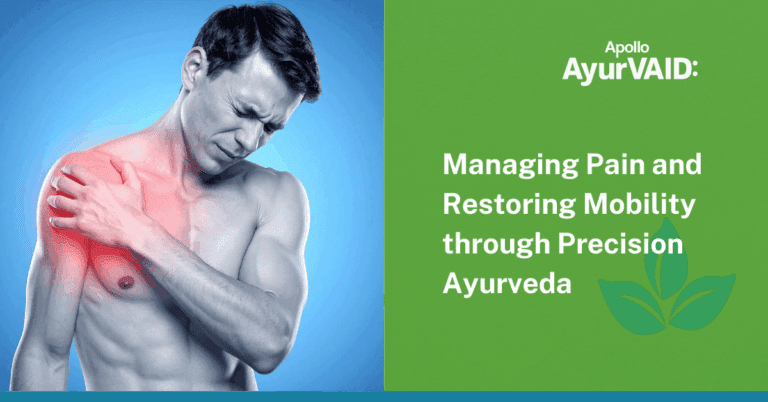Introduction
Constipation is usually considered as a minor problem. It is in fact a chronic health issue that may impair everyday activities due to physical pain and stress caused due to the discomfort. Millions across the globe suffer from constipation and it compromises quality of life for all age groups.In India, 22 percent of adults have severe symptoms, especially in women, elderly people and children, with a high female to male ratio. This Constipation Awareness Month, we are focusing on the theme “ Be Informed, Be Empowered”.
According to Ayurveda, constipation (Vibandha) is a Vata dosha imbalance, and is associated with digestive fire (Agni) and toxin accumulation (Ama). Constipation is more than a temporary discomfort; it is a serious functional health issue, the cause of which is, factors like low fiber diets, dehydration, and sedentary lifestyles.
In this blog, we will discuss more about constipation in Ayurveda and give you a holistic view of digestive wellness. We will provide practical strategies and natural remedies that are beyond symptomatic treatment. In the month of Constipation Awareness, let us know and improve our digestive well being.

Causes of Constipation
Knowing what causes constipation, can help a person suffering to avoid these factors and prevent worsening of the condition. Certain dietary habits, lifestyle choices, and psychological factors aggravate Vata Dosha, disturb colon function and result in dry and hard stool. These factors include –
- Dietary Habits: Dry, cold, or processed foods, low fiber and insufficient water can dry the intestines and increase Vata resulting in dry stools and constipation.
- Lifestyle Choices: Skipping meals or eating at odd times weakens the digestive fire, making it harder for the body to process food. Ignoring natural urges to go to the bathroom disrupts Vata and leads to a build-up of toxins, resulting in harder stools.
- Physical Inactivity: A sedentary lifestyle slows down intestine movements and hampers the digestion of the ingested food thus making stool harder to pass or incomplete evacuation.
- Psychological Factors: Ayurveda talks about the mind gut connection and in fact, it claims that the condition of the mind affects what is happening in the gut. Negative emotions weaken Agni and result in ama, slow digestion, while stress and anxiety upset Vata, causing dryness and irregular bowel movements.
Why Women and Children Are More Prone – The Role of Vega Dharana
Physiological, hormonal and behavioral factors make women and children more prone to constipation. Vega Dharana is one critical concept in Ayurveda that helps us understand this issue. Vega Dharana refers to the act of ignoring or prolonging the natural urges of the body to give reflex action. Purisha Vega dharana refers to suppression of the urge to defecate, which affects the normal functioning of one’s digestive system, especially Apana Vata (Vata dosha responsible for elimination). This suppression of urge in the long term can cause diseases like constipation, piles, fissure etc.
Vega Dharana and constipation are more common in women because of hormonal fluctuations, busy lifestyle, pelvic floor issues and restrictive diets. Hormonal changes disrupt Vata and in turn result in irregular or dry bowel movements. Hard stools and irregularity can be caused by busy lifestyles, caregiving responsibilities and lack of access to restrooms that delay response to natural urges.
During play and school, children often repress the urge to defecate, causing disturbed bowel patterns.Fear of defecation due to hard stool, poor toilet training are other causes for suppression of urge. Their digestive system is sensitive to what and how much they eat, when they eat, and their routine can lead to constipation. Hard stools and sluggish digestion can be caused by a low fiber diet and excess consumption of junk foods.

Complications of Constipation
Unmanaged constipation can lead to:
- Hemorrhoids and anal fissures: Straining during bowel movements due to constipation causes pressure on rectal veins, which results in painful swelling of or even tearing the lining of the anus.
- Rectal prolapse: Pelvic muscles weaken from chronic constipation, and can result in the rectum protruding through the anus.
- Dependency on laxatives: Over time, the body’s natural bowel movement mechanisms weaken, leading to a vicious cycle of artificial stimulation, resembling a car that requires a jump-start.
- Fecal impaction: The problem of sustained constipation, results in the accumulation of stool that turns harder which in turn clogs the colon giving rise to a significant amount of discomfort in the entire gastrointestinal tract.
Ayurveda Remedies to Prevent and Cure Constipation
Ayurveda emphasis on dietary and lifestyle modification to improve digestion and bowel movements.Apana Vata imbalance is the primary cause of constipation thus balancing it will help in root cause management. Following are a few steps which can be taken to aid in proper digestion and evacuation.
- Regular Meal Timings: Establish and sustain a consistent meal pattern, Try not to extend the time between meals, Have three meals in a day.
- Dietary Strategies: To aid in bulk and regular bowel function, incorporate a variety of fruits like prunes and figs, tubers such as elephant yam and ridge gourd, leafy greens, moong dal, urad dal, and probiotics including curd and buttermilk. Healthy fats such as ghee will help in digestion, while processed and refined sugars should be minimized to avoid constipation.
- Hydration: Constantly hydrate yourself so that the stools can be soft and evacuation can be easier. Drinking a glass of warm water infused with coriander or cumin, after brushing the teeth instead of bed coffee or tea can aid in proper digestion and facilitates good bowel movements.
- Avoid Excessive Caffeine and Alcohol: It is necessary to reduce alcohol and caffeinated drinks consumption, which can cause dehydration and constipation.
- Mindful Eating: Concentrating on food which you eat and relishing it has a major role in proper digestion, assimilation and elimination of it.
- Avoid Overeating and Heavy Meals: Avoid eating until hungry to allow the effective digestion of the previous meal and subsequent waste removal.
- Dietary Spices:Digestion aiding spices such as ginger, cumin, coriander, hing and fennel can be incorporated in diet.
- Regular Physical Activity: Perform some walking, integrate yoga or easier exercises to help maintain physical and mental health in turn aid proper digestion
- Daily Routines (Dinacharya): Make a routine – include consistent meal timings, wake up timings, bed timings to set your circadian rhythm right. These will help in timely digestion and clearing of bowel
- Managing Stress: Nadi Shodhana Pranayama, or listening to calming music will help you manage stress and assist in proper metabolism.
Ayurvedic Treatment for Constipation
Ayurveda provides an effective solution for constipation. The treatment aims at correcting the metabolism through dietary changes, lifestyle modification along with internal medicines and Panchakarma therapies after assessing the condition of the patient and severity. These modalities aid in cleansing and rejuvenating the digestive system including the colon for good health. For the treatment of constipation, and GI Cleansing therapies such as Abhyanga (Ayurvedic Oil massage), Swedana (steam therapy), Avagaha Swedana (warm water or medicated kashaya sitz bath), Virechana (purgation therapy) and Basti (enema therapy) can be adopted depending on the condition of the patient and severity. These therapies are administered after proper assessment by the qualified physicians.
Tips to Prevent Constipation
- Follow a Routine: Keep a regular meal and bowel routine.
- Stay Active: Yogasana such as Pavanamuktasana, Malasana and regular exercises stimulate digestion and aid in easy evacuation of the bowel.
- Avoid Vega Dharana: Pay attention to natural urges, especially the urge to pass stool and avoid suppressing it.
- Manage Stress: Pranayama and meditation can reduce the stress and maintain the proper digestion, absorption, elimination.
- Dietary Recommendations: Eat fibre rich vegetables like Ridge gourd, leafy vegetables, fruits like papaya, prunes, figs, stay hydrated, avoid junk and processed food.
Conclusion
In Ayurveda digestion is not limited to what you eat, it also depends upon how you live. The following steps can help prevent and manage constipation naturally: A healthy diet, maintaining a proper lifestyle, putting energy into exercising and looking out for your psychological health.
Constipation awareness month is the right opportunity to include Ayurveda remedies and treatment measures in your daily life and get rid of it. These remedies are beneficial in maintaining a healthy digestive system and help in overall wellbeing of an individual.
REFERENCES
- Talley, N (2004). Definitions, epidemiology, and impact of chronic constipation. Reviews in gastroenterological disorders, 4(Suppl 2), S3-S10. https://pubmed.ncbi.nlm.nih.gov/15184814
- Berg, M M et al. (2006). Epidemiology of Childhood Constipation: A Systematic Review. The American Journal of Gastroenterology, 101, 2401-2409. https://doi.org/10.1111/j.1572-0241.2006.00771.x
- Higgins, P, Johanson, J (2004). Epidemiology of Constipation in North America: A Systematic Review. American Journal of Gastroenterology, 99, 750-759. https://doi.org/10.1111/j.1572-0241.2004.04114.x
- Rajput, M, Saini, S (2014). Prevalence of Constipation Among the General Population: A Community-Based Survey From India. Gastroenterology Nursing, 37, 425–429. https://doi.org/10.1097/SGA.000
0000000000074 - Ray, G (2016). Evaluation of the Symptom of Constipation in Indian Patients. Journal of clinical and diagnostic research : JCDR, 10(4), OC01-3. https://doi.org/10.7860
/JCDR/2016/15487.7524 - Chatterjee, K, Nath, M (2022). Physician understanding and preferences on the current management and treatment approaches for chronic constipation: a cross-sectional survey-based study. International Journal of Research in Medical Sciences. https://doi.org/10.18203/2320-6012.ijrms20222838
- Kasthuri, A et al. (2013). Prevalence of constipation among elderly in a rural area of Bangalore.






